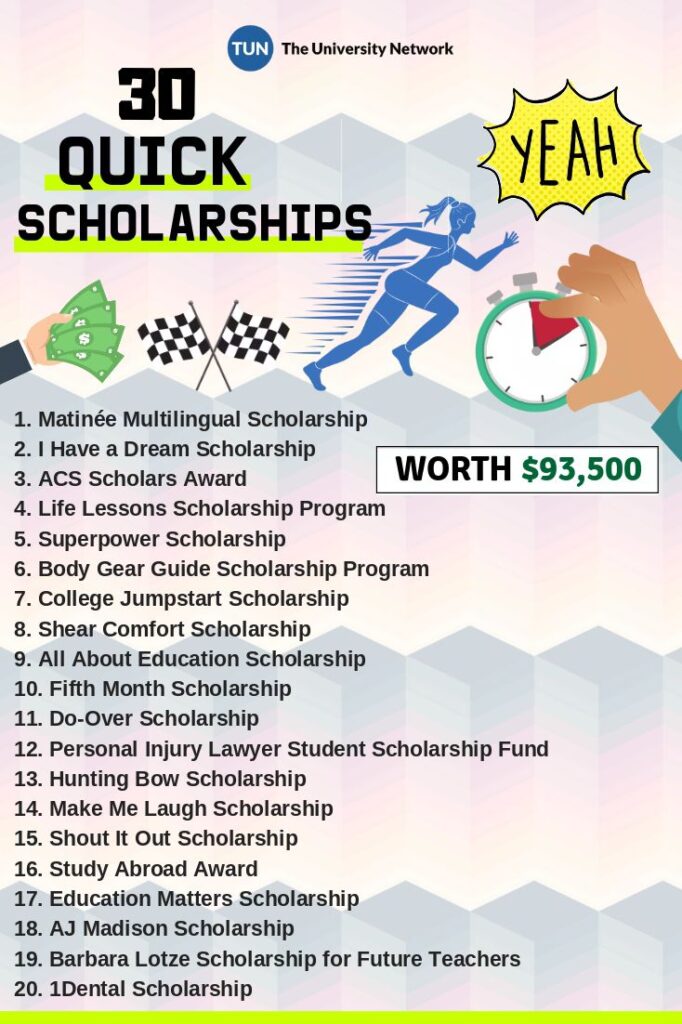That’s when I stumbled upon something different, something that felt almost too good to be true: quick scholarships.
Let me tell you, it wasn’t a single magic wand, but a collection of tiny, persistent efforts that slowly, steadily, chipped away at that mountain of cost. And today, I want to share my journey, my secret weapon, so you don’t feel as overwhelmed as I once did.
What Even Are Quick Scholarships? (And Why They’re Awesome)
Imagine scholarships not as grand, intimidating beasts, but as friendly, approachable little helpers. That’s what quick scholarships are. They’re typically smaller awards – think $100, $250, $500, or even $1,000 – but with a much lower barrier to entry.
Why are they awesome?
- Less Effort Per Application: Many require a short essay (250-500 words), a simple survey, a creative response, or sometimes, no essay at all! This means you can apply for more of them in less time.
- Less Competition: Because they’re smaller awards, fewer people often bother applying. Big money attracts big crowds; small money sometimes gets overlooked. That’s your advantage.
- Cumulative Effect: One $500 scholarship might not cover a whole semester, but five of them? That’s $2,500. Ten? That’s $5,000. It adds up, and every dollar helps.
- Confidence Boosters: Winning even a small scholarship is a huge psychological win. It tells you, "Hey, I can do this!" and fuels your motivation to keep going.
Think of them like finding loose change in your couch cushions, in your old jacket pockets, or on the sidewalk. Individually, they’re not much, but if you’re consistently looking and picking them up, suddenly you’ve got enough for a coffee, then lunch, then maybe even a small grocery run.
My First "Aha!" Moment: The $500 That Changed Everything
I was skeptical at first. I’d spent weeks agonizing over a 1,500-word essay for a major scholarship, only to get a polite "thanks but no thanks" email. My morale was in the basement.
Then, a friend mentioned a scholarship from a local credit union. It was for students pursuing a degree in any field, but they wanted a 300-word essay about "how you plan to contribute to your community." I rolled my eyes, thinking it was another waste of time. But 300 words? That’s like two decent paragraphs. I figured, "Why not?"
I wrote about my volunteer work at the animal shelter and how I hoped to use my future degree to advocate for animal welfare. It took me maybe an hour, spread across an evening.
A few weeks later, an email popped up. "Congratulations! You’ve been awarded a $500 scholarship…"
I stared at it. $500! It wasn’t life-changing money, no, but it was my money. Money I hadn’t had to borrow. Money that meant I could buy textbooks without feeling guilty, or maybe even treat myself to a decent meal instead of instant noodles for the fifth night in a row.
That little win was the spark. It showed me that these "quick" scholarships were real, accessible, and definitely worth my time.
Okay, So How Do You Find These Hidden Gems? My Go-To Playbook
Finding quick scholarships is a bit like treasure hunting. You need the right map and the right tools. Here’s how I did it:
1. Be a Smart Searcher (Keywords Matter!)
Don’t just type "scholarships" into Google. Get specific. Here are some of the search terms I used regularly:
- "Quick scholarships for college students"
- "Easy scholarships no essay"
- "Small scholarships"
- "Fast scholarships for high school seniors" (or "college freshmen," "sophomores," etc.)
- "Niche scholarships [your hobby/major/identity]"
- "Scholarships with short application"
Vary your terms, try different combinations. You’ll be surprised what pops up.
2. Dive Into Scholarship Platforms (With Filters!)
There are many fantastic scholarship search engines out there. The key is to use their filters religiously. Don’t just browse. Filter by:
- Award Amount: Look for those smaller awards ($100 – $1,000).
- Application Difficulty: Many platforms let you filter by "easy application" or "no essay."
- Deadline: Sort by upcoming deadlines to find opportunities you can tackle quickly.
- Eligibility: Your major, GPA, ethnicity, state of residence, hobbies, even your last name could be a scholarship category!
3. Local is Gold
This is often where the least competition lies. Don’t underestimate your hometown or state.
- Community Foundations: Many towns have a "Community Foundation" that manages local scholarships.
- Local Businesses: Banks, credit unions, rotary clubs, Lions Clubs, Chambers of Commerce – they often have small scholarships for local students. Check their websites or simply call and ask.
- High School Guidance Counselors/College Financial Aid Offices: They often have lists of local and regional opportunities that online databases might miss.
- Your Parents’ Employers: Some companies offer scholarships to children of their employees.
4. Your Unique Self is a Scholarship Category
This was a game-changer for me. Think about everything that makes you, well, you.
- Hobbies & Interests: Love gaming? There are gaming scholarships. Obsessed with knitting? There are scholarships for that. Play a niche sport? You guessed it.
- Major/Minor: Even if it’s not a common one, search for scholarships specific to your field of study.
- Heritage/Identity: Many organizations support students from specific ethnic backgrounds, religious affiliations, or LGBTQ+ communities.
- Even Quirky Traits: Are you left-handed? There’s a scholarship for that! Do you love duct tape? There have been scholarships for that too!
My Top Tips for Actually Winning Them (Beyond Just Applying)
Finding them is half the battle. Winning them is the other. Here’s what I learned through trial and error:
1. Read the Instructions (Seriously!)
This sounds basic, but it’s where so many people trip up. If they ask for 250 words, don’t submit 500. If they ask for a video, don’t send an essay. Following directions shows attention to detail and respect for the committee’s time.
2. Tailor Your Response
Even for short essays, don’t just copy and paste. Tweak your answer to specifically address their prompt and their organization’s values. A quick search of their website can give you clues. Showing you actually care enough to customize your answer goes a long way.
3. Keep it Concise and Authentic
With short word limits, every sentence counts. Get straight to the point. Let your personality shine through – don’t try to sound overly formal or use jargon. Committees are often looking for genuine voices.
4. Proofread, Proofread, Proofread
A typo in a 250-word essay sticks out like a sore thumb. Read it aloud. Ask a friend or family member to glance over it. Spellcheck isn’t always enough.
5. Don’t Get Discouraged by "No"
You will get rejections. I did. Many times. It’s a numbers game. For every ten quick scholarships I applied for, I might win one or two. The key is to keep applying. Don’t let one "no" stop you from applying for the next ten.
The Cumulative Effect: How Small Wins Add Up
My initial $500 slowly grew. I started setting a goal: apply for at least three quick scholarships a week. Some weeks I hit it, some I didn’t, but the consistency paid off.
That first year, I managed to string together about $3,000 from various small awards. That was enough to cover my textbooks, my meal plan for a semester, and a few essential supplies. The next year, I got even better at it, bringing in closer to $4,500.
It wasn’t a full ride, no, but it dramatically reduced the amount I had to borrow. It meant less stress, more focus on my studies, and the freedom to pursue internships without constantly worrying about money.
Your college journey doesn’t have to be buried under a mountain of debt. Quick scholarships are a real, accessible way to lighten that load. They might not be the flashiest, but they are incredibly effective.
So, take a deep breath. Start small. Start now. Your future self (and your wallet) will thank you. Happy hunting!



